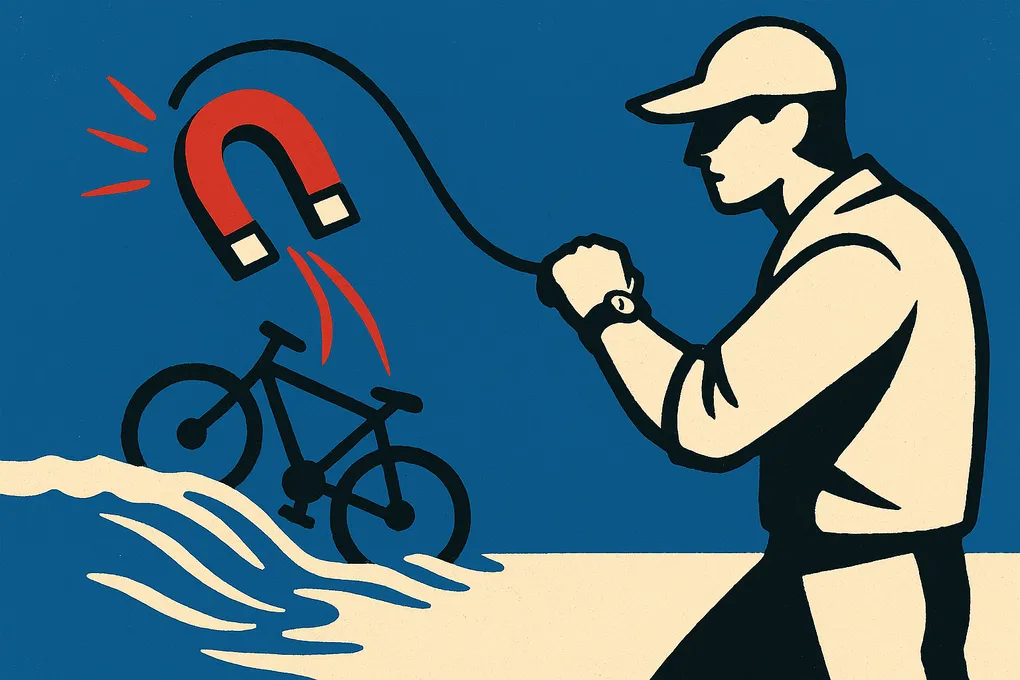How I Started Magnet Fishing
I first discovered magnet fishing years ago online. The idea of pulling forgotten metal objects from lakes and rivers sounded exciting, but I never tried it until a few friends founded an association called Ironic Professionals ry. They invited me to join, and that was enough motivation to finally start.
I ended up being part of the organization for years — first as a board member, then as the secretary. The association eventually dissolved in 2025 because of low membership and annoying banking fees, but the hobby didn’t go away. We kept going out together, just without the paperwork. Honestly, that made it even more fun.

My friend throwing a magnet.
What You Need for Magnet Fishing
Magnet fishing doesn’t require much to get started. A few essentials will make the experience easier and safer:
- 🧲 Strong neodymium magnet – Available from EU magnet stores or local Finnish chains like Puuilo and Biltema.
- 🧤 Rubber gloves – Keeps your hands clean and protected.
- 🪢 Strong rope – Tied securely so you don’t lose your magnet.
- 🗑️ Trash bags – For proper disposal of what you pull up.
- 💼 Loot bag – For anything interesting worth keeping.
Optional but nice to have:
- waterproof boots
- a metal brush for cleaning finds
- a small bucket or container
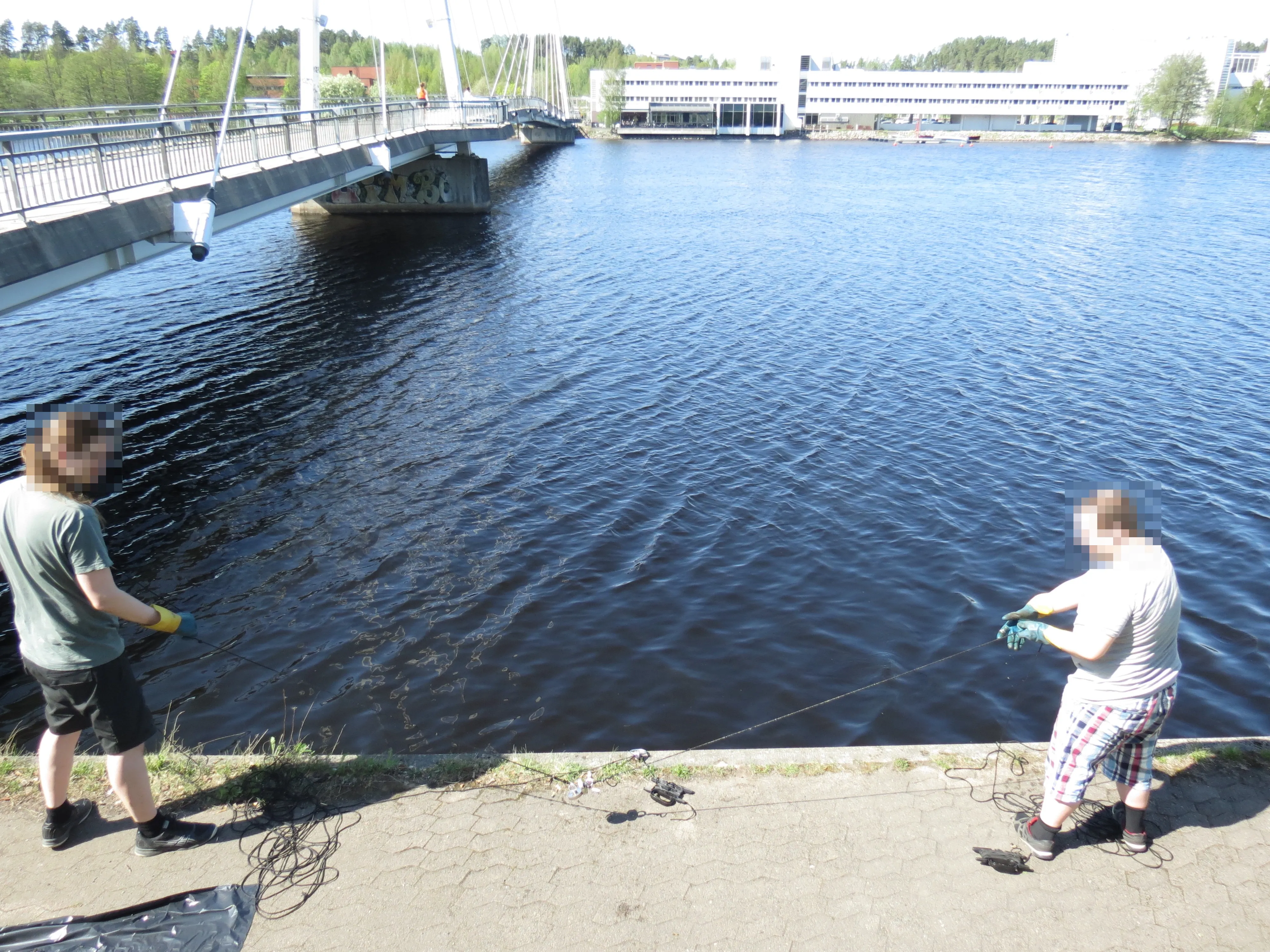
Magnets stuck together.
How Much Does Magnet Fishing Cost?
A solid beginner setup costs around €50–€100 depending on magnet strength. Gloves and bags cost almost nothing. Magnet fishing is inexpensive compared to most outdoor hobbies, and you can start almost anywhere with water.
You can buy cheaper ~€30 magnets, but they usually have weaker pull strength, which means fewer finds.
My Best and Strangest Magnet Fishing Finds
Over the years, we’ve pulled up everything from tiny screws to big surprises. Some highlights:
- 🎮 PlayStation 4
- 🔪 Chainsaw
- 👙 A pair of women’s underwear, snagged on a wire underwater
- 🚲 More bicycles than I can count
- Assorted tools, coins, metal scraps, and random items
Every trip is a mix of treasure hunt and environmental cleanup.
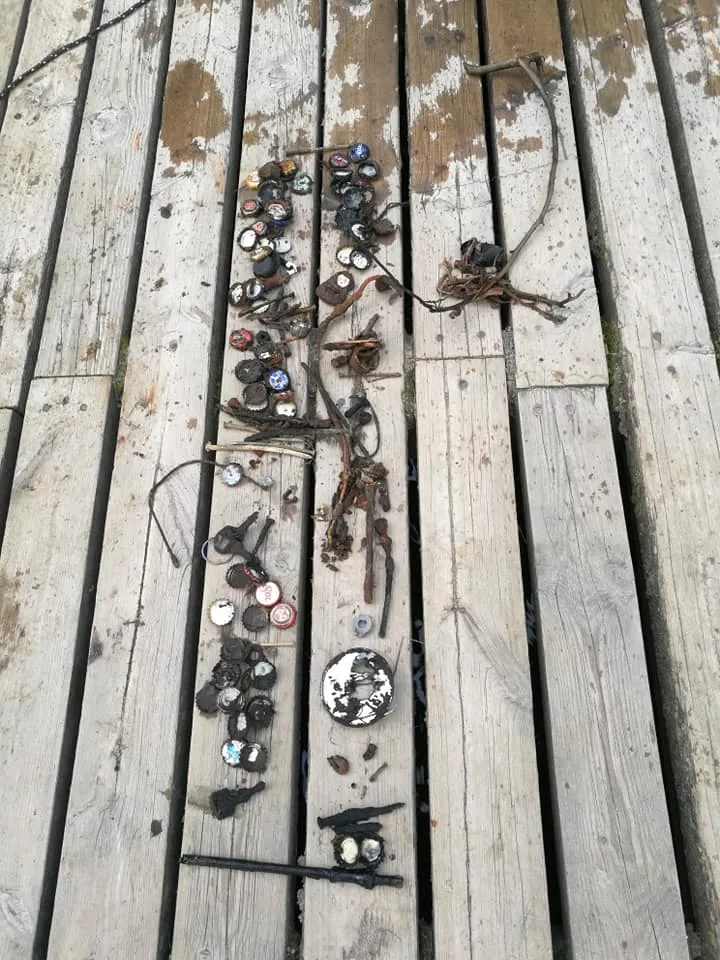
Some loot — mostly bottle caps and miscellaneous junk.
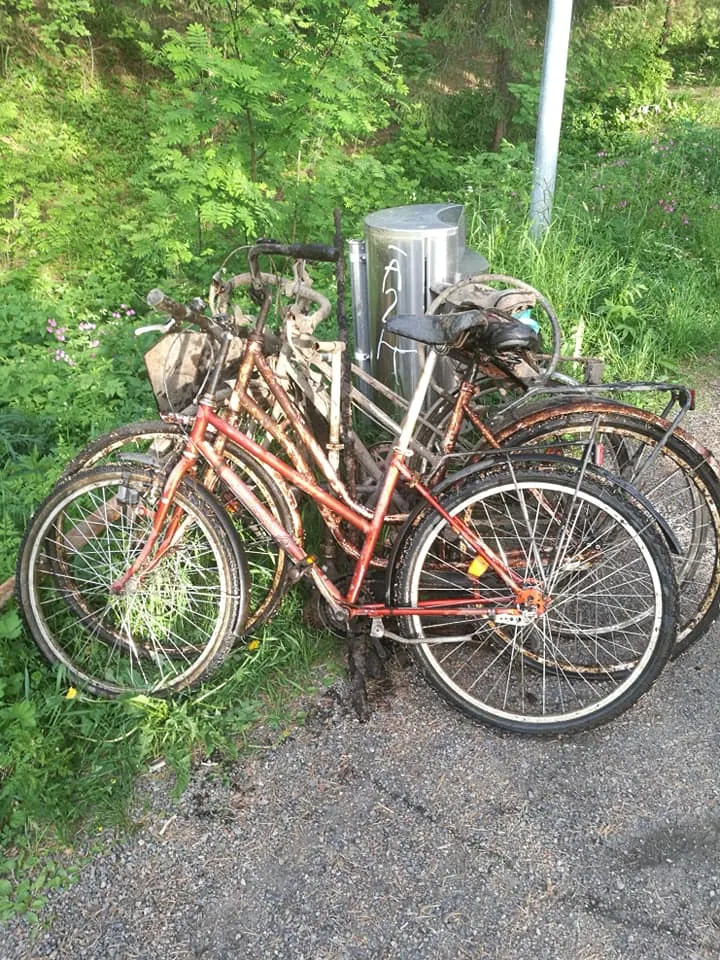
Bicycles found in a single afternoon.
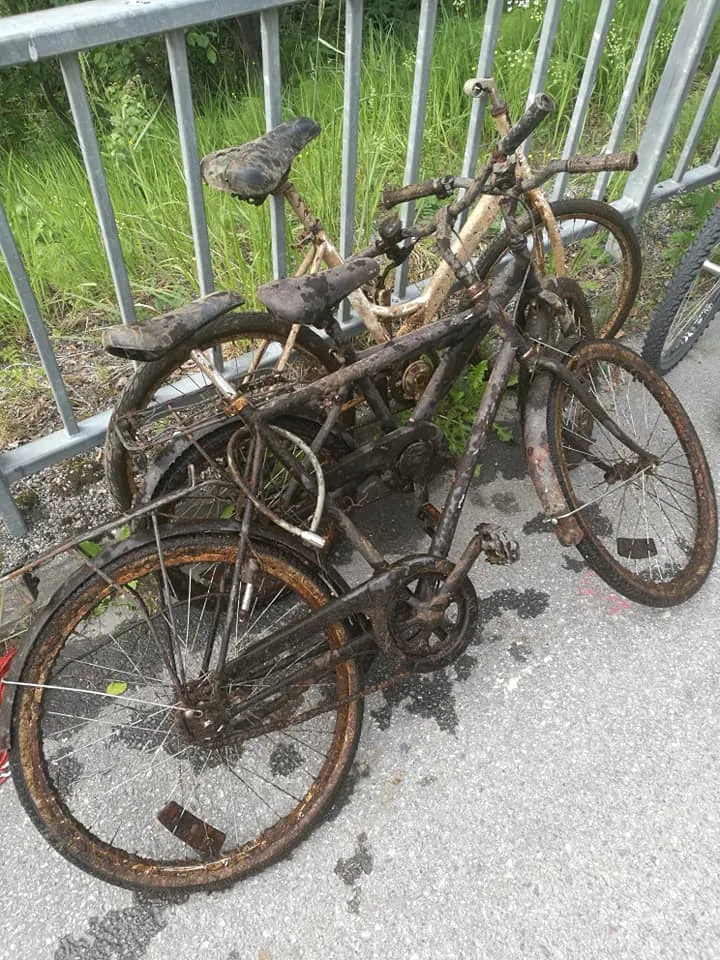
Even more bicycles from another trip.
Safety Tips and Environmental Notes
Magnet fishing cleans up waterways, but there are important safety rules:
- Check local regulations. Harbors and some bridges have restrictions or hidden metal structures that magnets stick to permanently.
- If you find old ammunition or weapons, especially WWII-era items, don’t touch them. In Finland, call the police.
- Never leave your finds on the shore — bring everything with you.
- Avoid dangerous spots with strong currents or slippery surfaces.
Sometimes a magnet gets stuck so hard that someone has to swim to fetch it. Other times it’s completely hopeless and you just have to leave it behind. It happens.
Who Should Try Magnet Fishing?
Magnet fishing is ideal for anyone who likes:
- treasure hunting
- spending time outdoors
- light environmental work
- simple, low-cost hobbies
It’s fun alone, but even better with friends. If you’re in the Jyväskylä area, feel free to reach out — I’m always open to taking newcomers along.
We also tried metal detecting now and then. It pairs naturally with magnet fishing, though detectors are more expensive, and sharing one detector means taking turns.
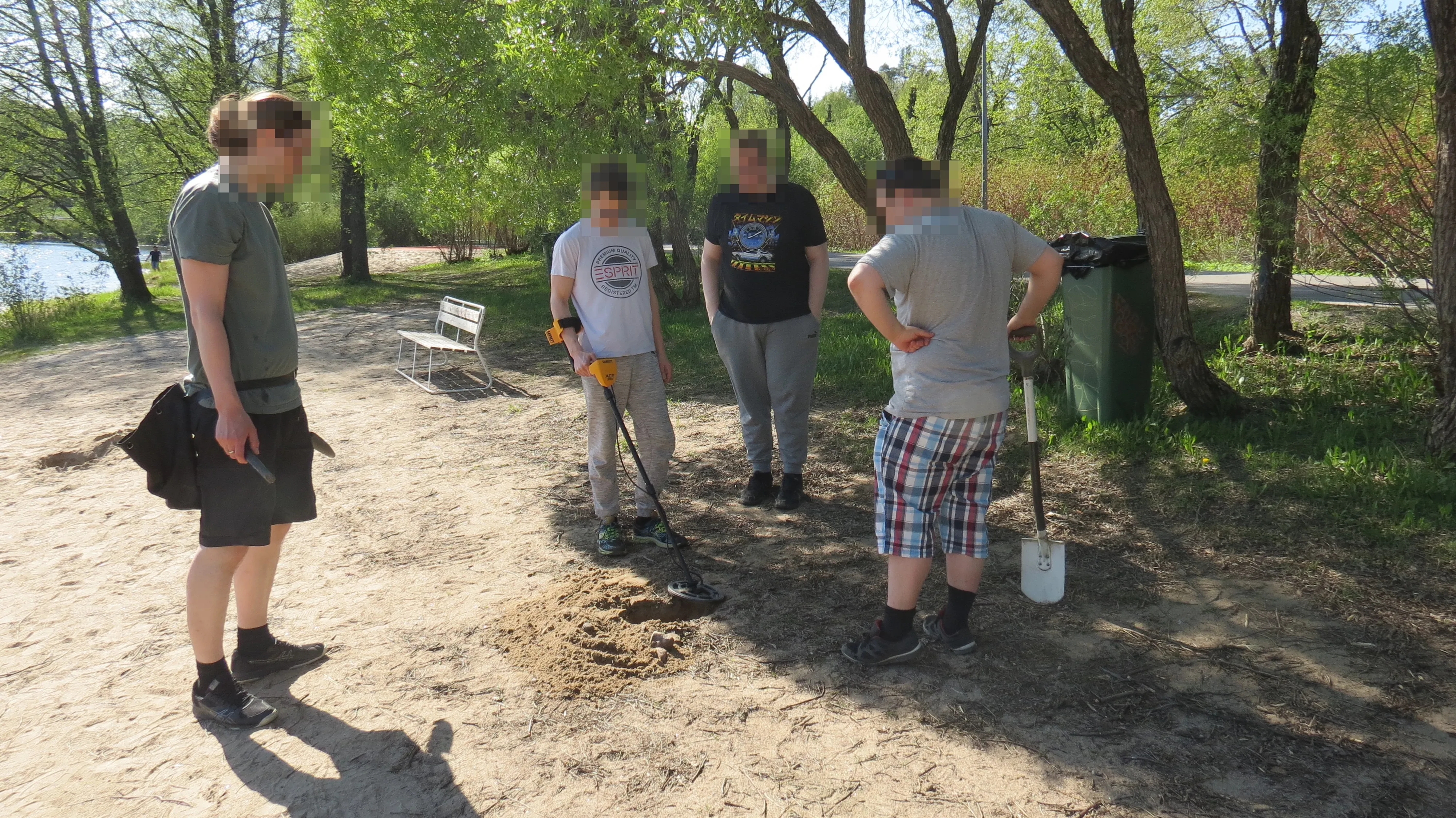
Metal detecting with friends.
Magnet Fishing Myths and Common Questions
🟡 Will a fishing magnet pick up gold?
No. Gold is not magnetic.
You won’t catch gold, silver, or copper coins with a magnet.
❤️ Are strong magnets harmful to the heart?
Magnets don’t affect a normal heart.
People with pacemakers or implanted medical devices should avoid them — the magnetic field can interfere with the device.
📱 Can a fishing magnet ruin my phone?
If it’s close enough, yes.
A strong neodymium magnet can damage:
- the compass/magnetometer
- some sensors
- magnetic strips on cards
- older hard drives
Keep your magnet a safe distance from electronics.
💶 Which euro coins are magnetic?
Euro coins with steel cores — 1¢, 2¢, and 5¢ — are slightly magnetic.
Coins 10¢ and above won’t stick to a magnet.
We’ve collected a surprising number of 5-cent coins over the years.
Final Thoughts
Magnet fishing is a simple mix of treasure hunting, environmental cleanup, and outdoor fun. You never know what you’ll pull up — sometimes it’s junk, sometimes it’s something unforgettable — but you always leave the water cleaner than you found it.
If you’re curious, grab a magnet, a rope, and a couple of friends, and head to the nearest lake or river. The best finds are the ones you don’t expect.
